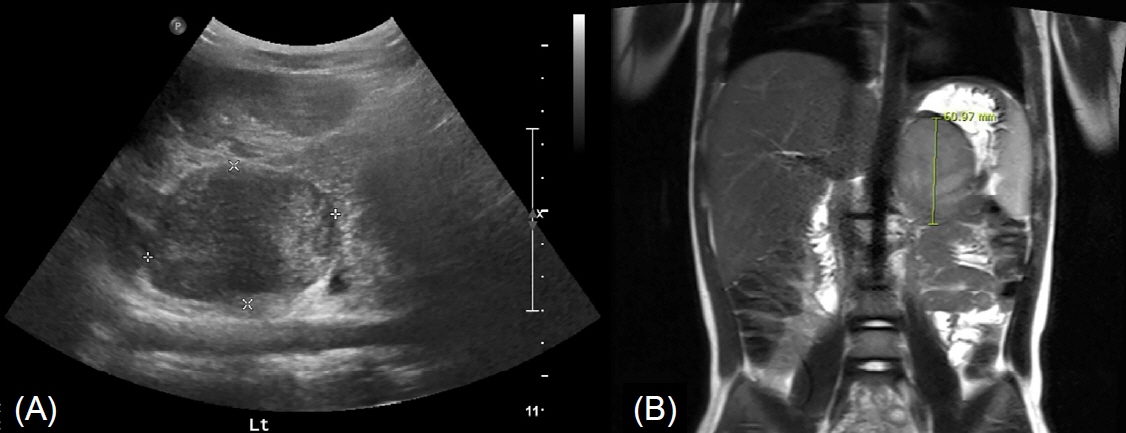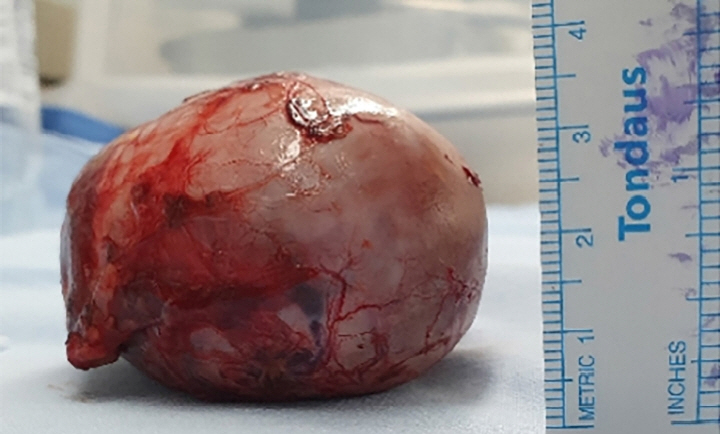Ann Pediatr Endocrinol Metab.
2022 Dec;27(4):315-319. 10.6065/apem.2142100.050.
Adrenocortical carcinoma and a sporadic MEN1 mutation in a 3-year-old girl: a case report
- Affiliations
-
- 1Department of Pediatrics, College of Medicine, The Catholic University of Korea, Seoul, Korea
- 2Department of Laboratory Medicine, College of Medicine, The Catholic University of Korea, Seoul, Korea
- 3Department of Surgery, College of Medicine, The Catholic University of Korea, Seoul, Korea
- KMID: 2537244
- DOI: http://doi.org/10.6065/apem.2142100.050
Abstract
- Childhood adrenocortical carcinoma (ACC) is a rare disease that is mostly linked to familial cancer syndrome. Although the prevalence of ACC is extremely low in children, it is clinically important to diagnose ACC early because age and tumor stage are closely related to prognosis. From this perspective, understanding the underlying genetics and possible symptoms of ACC is crucial in managing ACC with familial cancer syndromes. In this report, we present the case of a 3-year-old girl who initially presented with symptoms of precocious puberty and was later found to have ACC by imaging analysis. On genetic analysis, the patient was found to have a MEN1 gene mutation. MEN1 mutations are found in patients with multiple endocrine neoplasia type 1 (MEN1), usually precipitating multiple endocrine tumors, including pituitary adenoma, parathyroid hyperplasia, and adrenal tumors. Although MEN1 mutation is usually inherited in an autosomal dominant manner, neither of the patient’s parents had the same mutation, making hers a case of sporadic MEN1 mutation with initial presentation of ACC. The clinical course and further investigations of this patient are discussed in detail in this report.
Keyword
Figure
Cited by 2 articles
-
Overview of endocrine tumor syndromes manifesting as adrenal tumors
Ja Hye Kim
Ewha Med J. 2024;47(1):e4. doi: 10.12771/emj.2024.e4.Genetic Landscape and Clinical Manifestations of Multiple Endocrine Neoplasia Type 1 in a Korean Cohort: A Multicenter Retrospective Analysis
Boram Kim, Seung Hun Lee, Chang Ho Ahn, Han Na Jang, Sung Im Cho, Jee-Soo Lee, Yu-Mi Lee, Su-Jin Kim, Tae-Yon Sung, Kyu Eun Lee, Woochang Lee, Jung-Min Koh, Moon-Woo Seong, Jung Hee Kim
Endocrinol Metab. 2024;39(6):956-964. doi: 10.3803/EnM.2024.2008.
Reference
-
References
1. Kamilaris CDC, Stratakis CA. Multiple endocrine neoplasia type 1 (MEN1): an update and the significance of early genetic and clinical diagnosis. Front Endocrinol (Lausanne). 2019; 10:339.2. Thakker RV, Newey PJ, Walls GV, Bilezikian J, Dralle H, Ebeling PR, et al. Clinical practice guidelines for multiple endocrine neoplasia type 1 (MEN1). J Clin Endocrinol Metab. 2012; 97:2990–3011.3. Goudet P, Dalac A, Le Bras M, Cardot-Bauters C, Niccoli P, Levy-Bohbot N, et al. MEN1 disease occurring before 21 years old: a 160-patient cohort study from the Groupe d'etude des Tumeurs Endocrines. J Clin Endocrinol Metab. 2015; 100:1568–77.4. Gupta N, Rivera M, Novotny P, Rodriguez V, Bancos I, Lteif A. Adrenocortical carcinoma in children: a clinicopathological analysis of 41 patients at the Mayo Clinic from 1950 to 2017. Horm Res Paediatr. 2018; 90:8–18.5. Ribeiro RC, Pinto EM, Zambetti GP. Familial predisposition to adrenocortical tumors: clinical and biological features and management strategies. Best Pract Res Clin Endocrinol Metab. 2010; 24:477–90.6. Raymond VM, Else T, Everett JN, Long JM, Gruber SB, Hammer GD. Prevalence of germline TP53 mutations in a prospective series of unselected patients with adrenocortical carcinoma. J Clin Endocrinol Metab. 2013; 98:E119–25.7. Custodio G, Parise GA, Kiesel Filho N, Komechen H, Sabbaga CC, Rosati R, et al. Impact of neonatal screening and surveillance for the TP53 R337H mutation on early detection of childhood adrenocortical tumors. J Clin Oncol. 2013; 31:2619–26.8. Kwon EB, Jeong HR, Shim YS, Lee HS, Hwang JS. Multiple Endocrine neoplasia type 1 presenting as hypoglycemia due to insulinoma. J Korean Med Sci. 2016; 31:1003–6.9. Kim JH, Yun S, Hwang SS, Shim JO, Chae HW, Lee YJ, et al. The 2017 Korean National Growth Charts for children and adolescents: development, improvement, and prospects. Korean J Pediatr. 2018; 61:135–49.10. Wong DD, Spagnolo DV, Bisceglia M, Havlat M, McCallum D, Platten MA. Oncocytic adrenocortical neoplasms--a clinicopathologic study of 13 new cases emphasizing the importance of their recognition. Hum Pathol. 2011; 42:489–99.11. Richards S, Aziz N, Bale S, Bick D, Das S, Gastier-Foster J, et al. Standards and guidelines for the interpretation of sequence variants: a joint consensus recommendation of the American College of Medical Genetics and Genomics and the Association for Molecular Pathology. Genet Med. 2015; 17:405–24.12. Redlich A, Boxberger N, Strugala D, Fruhwald MC, Leuschner I, Kropf S, et al. Systemic treatment of adrenocortical carcinoma in children: data from the German GPOH-MET 97 trial. Klin Padiatr. 2012; 224:366–71.13. Brondani VB, Fragoso M. Pediatric adrenocortical tumor - review and management update. Curr Opin Endocrinol Diabetes Obes. 2020; 27:177–86.14. Hah JO. Intensive chemotherapy with autologous PBSCT for advanced adrenocortical carcinoma in a child. J Pediatr Hematol Oncol. 2008; 30:332–4.15. Teinturier C, Pauchard MS, Brugieres L, Landais P, Chaussain JL, Bougneres PF. Clinical and prognostic aspects of adrenocortical neoplasms in childhood. Med Pediatr Oncol. 1999; 32:106–11.16. McAteer JP, Huaco JA, Gow KW. Predictors of survival in pediatric adrenocortical carcinoma: a Surveillance, Epidemiology, and End Results (SEER) program study. J Pediatr Surg. 2013; 48:1025–31.17. Kwon A, Choi Y, Jung JW, Suh J, Kim HS. Using etomidate in a 2-month-old infant with cushing syndrome due to adrenocortical carcinoma. J Clin Res Pediatr Endocrinol. 2022; 14:102–6.18. Kim MS, Yang EJ, Cho DH, Hwang PH, Lee DY. Virilizing adrenocortical carcinoma advancing to central precocious puberty after surgery. Korean J Fam Med. 2015; 36:150–3.19. Ko JH, Lee HS, Hong J, Hwang JS. Virilizing adrenocortical carcinoma in a child with Turner syndrome and somatic TP53 gene mutation. Eur J Pediatr. 2010; 169:501–4.20. Lim YJ, Lee SM, Shin JH, Koh HC, Lee YH. Virilizing adrenocortical oncocytoma in a child: a case report. J Korean Med Sci. 2010; 25:1077–9.
- Full Text Links
- Actions
-
Cited
- CITED
-
- Close
- Share
- Similar articles
-
- Pituitary Neuroendocrine Tumors in Multiple Endocrine Neoplasia
- Somatic Mutational Analysis of MEN1 and Phenotypic Correlation in Sporadic Parathyroid Tumors
- A Case of Multiple Endocrine Neoplasia Type 1 Combined with Papillary Thyroid Carcinoma
- Characteristics of the Germline MEN1 Mutations in Korea: A Literature Review
- A Case of Cushing's Syndrome caused by Adrenocortical Carcinoma



